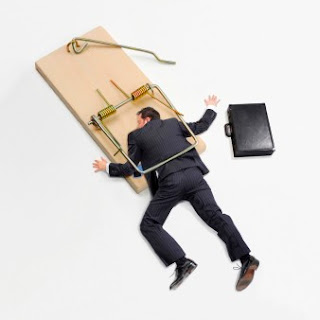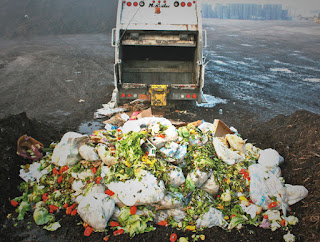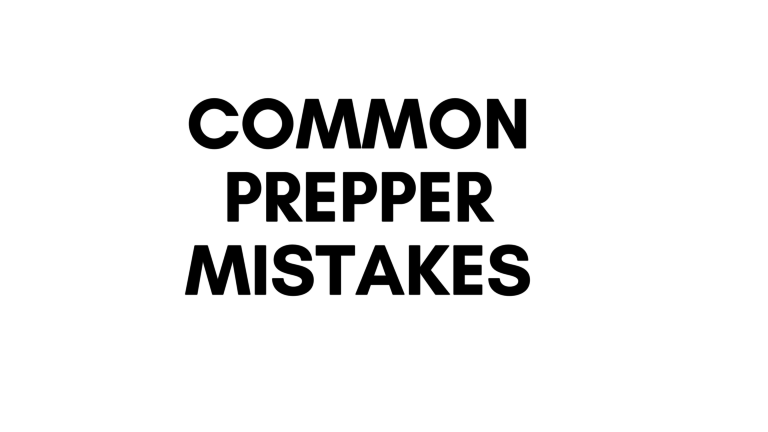
Prepper preparation necessarily involves difficulties and challenges to be overcome. While some are easily solved, there are others that can turn out to be misleading and lead to catastrophe.
Many of these problems are not obvious at first sight and usually appear when it is too late. Still others develop just before our eyes.
Here are six common errors of preppers who, depending on the circumstances, could prove fatal. So it is better to know them to avoid them …
There are 3 major steps in the preparation of any prepper:
- The constitution of stocks (food, weapons, ammunition, equipment, etc.)
- The accumulation of knowledge (how to survive in relation to the environment)
- The collection of information about the community (neighbors, family) to see who could be trusted in a scenario of collapse
Most of these problems can arise at any time, but usually appear when our alertness falls or we are too sure of ourselves.
1 ° error: Not properly handling food
There are many aspects to food management, and if one is neglected, it can affect the integrity of the entire stock. Without water and food, there is very little chance of survival. In such an eventuality, all that remains is to fall back on the second point mentioned above, namely knowledge; Or, worse still, depend on other members of the community for our daily needs, knowing that sharing food in times of crisis is a miracle and should not be over-relied on.
Imagine a catastrophe happening and you discover that your stocks are moldy or infested with bugs … This is not a mad hypothesis and this often happens, Especially when we become too confident and think we have taken all the necessary assurances. Even if you think you have excelled in organizing your pantry, there will always be things to do on a daily basis; For example, putting in place a system of inventory rotation and ensuring that someone (you and another member of the community) is assigned to their regular inspection and verification of expiry dates.
Another aspect of poor food management would be to not have enough . Having to fight to feed his wife and children is not the ideal scenario. This is why you need to know the amount of food you need for the whole family. This can be done by noting the totality of what you consume over a week, and multiplying by so much over a period considered. Once this is done, you will have a good idea of the quantity and nature of the commodities you need to collect – buy or produce – and store for the duration you have set.
If you have children, it is good to plan a little more than necessary. It is well known that children never have enough and always want more … A good formula could be the following:
Storing inappropriate foods is another often neglected aspect, and some preppers make the mistake of overly favoring what might be called ” comfort foods .” Undoubtedly this is due to our Western way of life which allows everyone to have practically everything he wants or likes. However, a serious preppers should know that you should first focus on dry food and canned second, if possible “home”.
Know that in survival, everything will be good. A small tile of chocolate at the end of a meal will quickly appear like a king dish, whereas it would have taken a whole cake to satisfy you in normal times. However, There is nothing like a prolonged period of scarcity to put the ideas in place, and that is unfortunately what most people need today. It is time to return to a healthy foundation, and that everyone should be forced to regret bitterly all the waste that could have been made in the past, especially on food.

2nd error: Not having a long-term plan
Storing food and equipment is definitely a good thing, as long as it will prepare you for emergencies. But what happens when you have exhausted all your reserves? One thing is for sure, you will have to rely on your plan B, and if you do not, you will be cooked. Without a plan that holds the road, you will depend on others, and especially luck. But the two will eventually run out after a while.
A) The first step in good risk management is to have a good map of the surroundings and to establish a route in case of evacuation. Once you know the area well, you will need to place rally points to meet your group when the time comes, If you have a group, and if that is the plan.
But before taking the road, this assumes of course and in the first place to have a place to go . This place can be an ADB ideally – the same as the 99% of survivors who do not own it – or a property that you have previously identified and selected for its strategic qualities (defense, resources, autonomy, etc.) .).
For example, and for a couple or family that does not have ADB or group, one of the possible strategies might be:
– Before chaos (ie now): I store food and equipment To hold at least three months in complete autonomy at the place where I am; I take advantage of my weekend to take the car and drive around to select a property with the qualities necessary for the development of a BAD.
* If I live in a rural or semi-urban environment, then this property should be within a short distance of my current home so that it can be easily reached and minimize the risk of exposure during the journey.
* If I live in an urban area (big city or metropolis) then this property could be at a distance more or less distant but accessible by vehicle without having to use more than half a fill of tank.
– During the chaos : Depending on the circumstances and events, I land three months with my family at the place where I live, or evacuate immediately before the situation degenerates.
– After the chaos , or as soon as the situation permits, I evacuate towards the planned withdrawal point. In three months, it is more than likely that things have evolved drastically – to the point, why not, to be able to own the property in question …
b) The second step is to develop the skills which allow you to produce or harvest water and food. To do this, it is necessary to study alot, collect knowledge and learn to use the different equipment (how to make a water filter, an animal trap, How to cook without electricity, etc.).
If this irritates you, then you could pass this job on to your wife or your kids, and take over the “defense” side with the appropriate materials and know-how. AfDBs and other constituencies will still need competent people to defend them. I assure you, have no doubt about it. We have already spoken on this point many times; Needless to add.
C) The third step for all long-term plans is to have a defense strategy (whether you decide to stay at home or evacuate). Otherwise, you are not going to be able to handle the most deadly peril, namely people. Building a defense strategy takes time, And you must plan everything from the cache of food to the fortification of the home.
Last thing: Make sure you stay up to date with the latest information about the world of survivalism and the world around you. Learn as much as you can, as long as you do not know what knowledge will be useful to you. Keep in touch with the latest information about the world of survivalism and the world around you.

3 ° mistake: Understanding the environment and its potential
This aspect is intimately linked to the place where one lives, and to what one can draw from it. Do you live in a cold and humid area, or rather warm and sunny? What are the natural and human disasters you might expect? Is it a densely populated area? All these questions are of vital importance for survivalistic preparation, insofar as the environment plays a decisive role in a strategy of survival.
To distinguish yourself among the masses and not to sink with it at the first signs of chaos, you must have an advantage ; You have to know how to fight and how to survive in the environment in which you live. It is knowledge of your environment, among others, that will give you such an advantage.
- What are the edible plants that grow in your area, the medicinal ones, and the toxic ones in particular? Do you know at least how to distinguish dandelions from other herbs in the garden?
- Where can we find drinking water in your immediate environment? How long do you need to get to this water point, and once you get there, would there be any risk of others taking ownership of that resource?
- Which areas are the least populated, and what are the commodities you could find there?
- What type of soil do you have? What can you do?
- What type of equipment do you need, depending on the climate and the seasons?
- What do you know about your neighbors? Eventually, what would you be able to retrieve from their homes in case (or not) they are no longer there? Are they kind, do they represent a potential danger to yourself or your family? (The deal could change and turn them into looters).
- Do you live in a high-risk area? Are there points of interest in your immediate vicinity – supermarkets, DIY stores, etc. – that could attract predators?
These are so many questions, and there are others, that you must ask yourself; These are questions that will have to be answered in terms of strategy, and which involve so many measures to be taken upstream.
4 ° error: Do not have the right equipment
Many preppers believe that they will be able to survive with only a knife in their pocket. These are often those who have done a survival course or two in nature, who discovered quite astounded that they could spend two nights in a down and wake alive the next day, or even not eating for two days, believing That the life on the ground is not as hard as they imagined and that they could repeat or extend the experience without any hassle when the time comes …
For the majority of us, it seems obvious to me that having the right tools on hand would save us a lot of problems.
As regards the purchase of equipment and their storage,
- Leave the others too specialized tools and select as many as possible. You will have fewer things to spoil when the time comes.
- Choose good quality tools, and avoid those requiring electrical energy to function, as long as you do not know if you will dispose of them.
- Consider their weight in the event of an evacuation. Select the most compact and lightest.
- If you opt for power tools, make sure they are rechargeable and plan an alternative method of recharging. It must be a mobile solution, which can be used for other uses such as a universal generator (eg solar panels).
- Select the tools you really need, and which tools you can use. Do not store tools that you think might be useful but that you can not use.
The term “tools” should be used in a broad sense, and the majority of these rules also apply to equipment dedicated to personal defense, especially weapons and ammunition.

5th error: To store too many weapons and ammunition
It is likely that some of my readers will be surprised to see me write such a rule … What I mean is that having an arsenal will not serve you unless you have a budget that (Knowing that everything else will have to be in the same proportion), and to provide for a seat. Either the kind of scenario in which you would have to defend your home against armed packs or a very large number of people. Such a scenario is not the one on which you need to focus, and you will not be able to do it if you are alone, anyway.
To the extent that we have to keep to a minimum, and our budget is limited, we have to get to the point. What is needed is a weapon that can serve both to hunt, possibly, And above all to defend themselves; A weapon with a sufficient range and for which the price of the ammunition as well as their availability does not pose any major problem. Given all these factors, one fate of the lot. You guessed it: The caliber 12 .
A shotgun is the weapon you need if you only need one. Then, and as has been said many times on this blog, others can be added such as a handgun, and a long gun with striped cannon, the first being a rifle in 22 LR. It is obvious that those with particular skills such as long-range shooting will need to be operational in this area, with the appropriate weapon and ammunition.
Some ammunition boxes and a cleaning kit should accompany them. This is in the most common case, unless you consider a Cameroon at home, or a full-fledged mercenary job. But even in this case, it is necessary to envisage the possibility of a forced evacuation, and therefore of the transport. You will not be able to take everything with you, and anything you could leave behind will be recovered by the competition.
You would act against your own interests by putting all your savings in the purchase of weapons and ammunition, and Neglecting other aspects of survival such as food, knowledge or tools. You will not be able to feed on cartridges, and a weapon can not teach you how to plant tomatoes. However, if money is not a problem and you really want to play the trigger, such a limitation might not (too) concern you.

Error 6: Do not include family and friends in his survival strategy
Although the tendency in the survivalistic milieu is to prepare only for oneself and for family members, it is important to understand that “no man is an island.” You should also include your neighbors, colleagues and friends in general, since you will never know in advance when you and your loved ones could benefit from their skills and knowledge.
Perhaps one of your good friends is a doctor, a carpenter, a farmer, a soldier, a locksmith, and so on. ; Maybe one of these skills would help you once the chaos comes? It is important to keep them on hand and possibly include them in your strategy. If you have enough confidence in them, you can let them know about your preparations, Establish meeting points in case of evacuation, or train with them.
Perhaps one of them owns a house outside the urban area, which could then be a good place to store supplies and equipment, and a good hideaway in case of disturbances. If it turns out that they are also survivalists, you could share resources, know-how, and more importantly, protect each other in an attack. Even if trust is a difficult thing to give, especially in times of chaos, you will have better chances of survival by surrounding yourself with worthy people. And I believe that after having known someone for years, one can have some idea about it, We must make known to him the details of our preparation, or leave him alone.
On the psychological level, being part of a group brings invaluable support to each individual. That’s what makes the strength of elite troops around the world. It is probable that none of their soldiers could have endured discipline, training and physical trials if it had not been brought to the group dynamics at any time.
Being part of a community will also allow you to endure the suffering and deprivation that will necessarily bring the scenarios of collapse. Mental – and therefore physical – will last much longer if people who share your goals and interests are with you.
In other words, you will become crazy much less quickly … This is , in my opinion, are the main mistakes that could be committed by the preppers. No doubt there are others, and no doubt also that some of those enunciated deserve further development. We will have the opportunity to come back in future articles … And doubtless also that some of those stated would merit further development. We will have the opportunity to come back in future articles … And doubtless also that some of those stated would merit further development. We will have the opportunity to come back in future articles …
